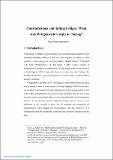Contradictions and falling bridges : what was Wittgenstein’s reply to Turing?
Abstract
In this paper, I offer a close reading of Wittgenstein's remarks on inconsistency, mostly as they appear in the Lectures on the Foundations of Mathematics. I focus especially on an objection to Wittgenstein's view given by Alan Turing, who attended the lectures, the so called ‘falling bridges’-objection. Wittgenstein's position is that if contradictions arise in some practice of language, they are not necessarily fatal to that practice nor necessitate a revision of that practice. If we then assume that we have adopted a paraconsistent logic, Wittgenstein's answer to Turing is that if we run into trouble building our bridge, it is either because we have made a calculation mistake or our calculus does not actually describe the phenomenon it is intended to model. The possibility of either kind of error is not particular to contradictions nor to inconsistency, and thus contradictions do not have any special status as a thing to be avoided.
Citation
Matthíasson , Á B 2020 , ' Contradictions and falling bridges : what was Wittgenstein’s reply to Turing? ' , British Journal for the History of Philosophy , vol. Latest Articles . https://doi.org/10.1080/09608788.2020.1815646
Publication
British Journal for the History of Philosophy
Status
Peer reviewed
ISSN
0960-8788Type
Journal article
Description
Funding: Work on this article has received funding from the European Union's Horizon 2020 Research and Innovation programme under Grant Agreement no. 675415.Collections
Items in the St Andrews Research Repository are protected by copyright, with all rights reserved, unless otherwise indicated.

